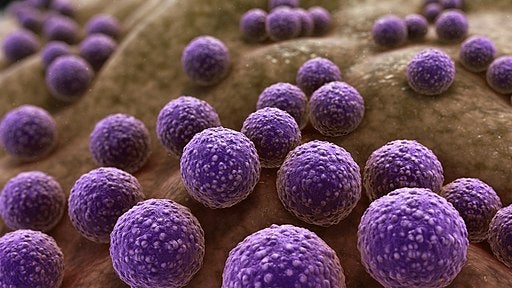Interaction of the immune system with the bacterium Staphylococcus aureus leads to generation of the innate and adaptive immune responses in our body. On one hand, binding of S. aureus glycans to a specific receptor on dermal dendritic cells in the skin triggers a range of pro-inflammatory responses, including cytokine production. On the other hand, continuous interplay with S. aureus leads to development of S. aureus-specific tissue-resident memory CD4+ T cells in the skin of healthy subjects. However, despite the presence of memory CD4+ T cell against S. aureus, there is still a high recurrence of staphylococcal infections. Targeting of specific dendritic cells (involved in the bacterial recognition), and T cell populations (important for anti-staphylococcal adaptive responses) could be useful when designing new vaccination strategies against chronic S. aureus infection.
The bacterium Staphylococcus aureus (S. aureus) is a common member of the human microbiome, colonizing the skin and nares of up to 30 percent of the population. Simultaneously, S. aureus is the most frequent cause of skin and soft tissue infections (SSTIs). SSTIs represent a heterogeneous group of infections that vary from mild disease manifestations, such as cellulitis and impetigo, to severe and life-threatening diseases, like surgical site infections. Untreated SSTIs can lead to the development of bloodstream infections including sepsis and endocarditis. Understanding the molecular mechanisms underlying S. aureus infections is important to develop new effective treatments. Defense against S. aureus infection requires the contribution of both the innate and adaptive parts of the immune system. Understanding which bacterial molecules are important for the recognition of S. aureus by dendritic cells (DCs) could represent an important factor in vaccine design, especially in the context of inducing T cell memory responses.
The PhD thesis of Malgorzata Mnich (Department of Medical Microbiology, UMC Utrecht) covers two important aspects of immunity against S. aureus: bacterial recognition and formation of memory responses. First, she has discovered a new interaction between the Macrophage Galactose-type C-type Lectin (MGL) receptor present on DCs and carbohydrates present on the S. aureus surface. Binding of S. aureus to MGL triggers important pro-inflammatory cytokines by DCs during S. aureus infections. Since this receptor is present on DCs residing in the dermal compartment of the skin, interaction with MGL would occur only during the deeper infections.
In the second part of her thesis Mnich showed for the first time evidence for the presence of S. aureus-specific tissue-resident memory CD4+ T cells in the skin of healthy subjects. This finding was followed by the in-depth characterization of S. aureus-specific CD4+ T cells from the circulation of healthy subjects. Using single-cell mRNA sequencing she also discovered unique T cell populations not described for S. aureus before, namely regulatory and cytotoxic T cells.
CD4+ T cells have been described as important players in protective immunity against S. aureus. Despite the presence of CD4+ T cell memory responses against S. aureus as reported in this PhD thesis, there is a high recurrence of staphylococcal infections, creating a huge unmet medical need for (secondary) prevention. Malgorzata Mnich on the ramifications of her results: “The identification of the new interactions between S. aureus and host-expressed molecules can provide more insight in the mechanism of bacterial recognition and how it affects the adaptive immune system. Based on our research I have suggested strategies to induce these responses through innovative vaccine design and administration. In addition, identification and in-depth characterization of novel CD4+ T cell populations among S. aureus-specific cells could lead to a better understanding S. aureus immune evasion mechanisms and eventually can help in the design of new candidate vaccines.”
Malgorzata Mnich, PhD
Malgorzata Ewa Mnich (1992, Cracow, Poland) defended her PhD thesis on January 12, 2022 at Utrecht University. The title of her thesis is “Skin immunity in protection against Staphylococcus aureus infections”. Supervisors were prof. dr. Jos van Strijp (Department of Medical Microbiology, UMC Utrecht) and prof. dr. Nina van Sorge (Department of Medical Microbiology and Infection Prevention, Amsterdam UMC). Co-supervisor was dr. Elisabetta Soldaini (GSK Vaccines, Siena, Italy).

